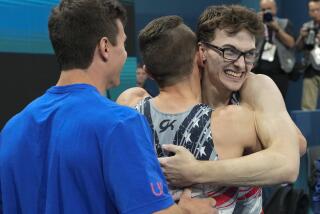DemiDec Dan is a legend in Academic Decathlon’s rarefied world
- Share via
ALBUQUERQUE — As he strode into the hotel ballroom, scores of high school students swarmed the man they know as DemiDec Dan, a legend in the world of Academic Decathlon.
The students, competing for the national decathlon title, clamored for the chance to shake his hand. They posed for pictures with him. They reached out for one of the colorful wool finger puppets he has turned into the unofficial mascot of the academic competition.
“I’m meeting DemiDec Dan!” one boy exclaimed.
“Look at your adoring fans!” said another.
Daniel Berdichevsky is an Academic Decathlon star. He once set a record for the highest individual score in the grueling, 10-subject competition. But that wasn’t all that set him apart from the crowd of teenage admirers.
Berdichevsky is 35. He achieved his record in 1993, before many of the students in the ballroom that day were born.
Since then, he has parlayed his love for the event and nostalgia for his glory days into a livelihood.
He started a test preparation company, DemiDec, while still a student at Taft High School in Woodland Hills and has since launched an international variation of the decathlon called the World Scholar’s Cup.
He travels so much — racking up 350,000 frequent flier miles a year by his count — that he gave up his apartment and crashes in his old bedroom at his parents’ home in the San Fernando Valley.
Wherever he goes, students greet him like a rock star. They know about his high score and have used his phone-book-size study guides.
In February, students waiting to compete in a decathlon event at Roybal Learning Center in Echo Park dropped their DemiDec guides and ran to him. Some bowed.
Weeks later in the United Arab Emirates, a 14-year-old girl handed Berdichevsky a handwritten biography, bound in yarn, so detailed that it touched on his student days at Stanford University and included a childhood photo of him with an alpaca.
“I think I am a professional decathlete,” he said. “I wouldn’t have imagined it, but I’m glad it has turned out this way.”
Years ago, friends and mentors foresaw a different future for Berdichevsky.
“I would have loved if Daniel had been a doctor or a lawyer,” said Arthur Berchin, the longtime decathlon coach at Taft High. “He would have been successful in any of the professions.”
He chose decathlon.
“The high school cheerleader gets to go to college and do a little cheer, and she’s done,” said Jennifer Berdichevsky, his sister. Decathlon “has become his life. It’s a way of living that every day of his life, and he didn’t have to let go.”
::
To understand the cult-figure status of Daniel Berdichevsky, you have to know a little about decathlon.
It isn’t the kind of extracurricular activity in which students can get by with the occasional after-school meeting; it’s a lifestyle.
Students give up weekends, holidays, even chunks of summer vacation to pore over thick study guides in pursuit of success. At the most competitive schools, a new season of decathlon begins a few weeks after the previous one ended.
The two-day trial of intellectual acuity and stamina begins with written tests in such subjects as math and science, literature and music. The teams give speeches and are interviewed by judges. The competition concludes with its only public event: a high-stress, multiple-choice history test.
The decathlon looks good on a college application, but students who participate say that’s not the reason they do it. There are other, less stressful ways to beef up a resume.
In mastering a broad area of knowledge, bright students often face their first true intellectual challenge.
Even now, Berdichevsky lights up when he talks about his decathlon days at Taft. There was the time his teammates attracted the attention of a police officer wanting to know what they were doing at school at 3 a.m. (Studying, of course.)
They made copies of the school’s master keys so they could wander freely after hours, and cleaned an old toilet they found and put it in their coach’s classroom. (It was for a teammate whose favorite study spot was a faculty restroom.)
Team members spent almost all their time together. “It was a family away from family,” Berchin said.
A number of former decathlon competitors have gone on to become team coaches, and some of them analyze teams and handicap competitions on a DemiDec message board.
“You know how some people follow everything that has to do with football?” said Robb Dooling, 21, a former competitor from Omaha who is now studying computer science at the Rochester Institute of Technology. “That’s me with decathlon. It’s an obsession.”
::
Berdichevsky’s decathlon destiny traces to a May 2, 1989, newspaper headline: “Taft High Team Wins U.S. Title in Academic Decathlon Competition.”
His parents read about the school’s decathlon success in the Los Angeles Times when they were choosing between two houses, one of which was near Taft. That decided it.
“You couldn’t be at Taft and not hear about decathlon,” Berdichevsky said. “The competitive intensity and the geeky quirkiness — that appealed to me.”
He tried out in 1992 but said he balked at having to give a speech in the competition and dropped out to become decathlon beat reporter for the school paper, the Taft Tribune.
He tried again the next year, made the team and never left.
Berdichevsky, who became de facto captain, had boundless energy and enthusiasm. He was also terribly disorganized. He once lost the money team members had pooled to buy flowers for the school secretary.
“Benjamin Franklin was a brilliant person, but the one area where he had a shortcoming was order — and that’s Daniel,” Berchin said.
But he had an intensity unusual for a teenager. Berchin remembered a time when Berdichevsky fumbled during a competition.
“This will never happen again,” Berdichevsky told him.
It didn’t.
At the city competition in the 1993-94 season, he scored 9,297 points, a record that stood until 2008. In 1994, the team made it to the nationals and won.
::
Berdichevsky started DemiDec during his senior year at Taft.
The company has carved out a place in the cottage industry of decathlon by infusing its guides and other study aids with Berdichevsky’s self-described nerdy humor. (One guide included a doctored photo of his dog piloting an airplane and a passage comparing the development of a city to an episode of “Battlestar Gallactica” in which survivors are sent to the far corners of the universe to restart civilization.)
As he continued to build DemiDec, he spent a year at Harvard, then transferred to Stanford, where he earned a bachelor’s degree in science, technology and society and a master’s degree in history. (He returned to Harvard and obtained a master’s in public policy from theJohn F. KennedySchool of Government in 2005.)
As the Berdichevsky family home in a gated Woodland Hills community began filling with stacks of study guides, his family supported him — and even spent late nights helping him hand-address marketing mailers to hundreds of high schools.
His mother, Rosie, helps run the business when he’s on the road.
The company has a dozen mostly part-time employees who plan curricula and write tests, and nearly 700 schools are customers.
Berdichevsky says the company does well enough to pay him a salary, but he plows the money into the Scholar’s Cup instead. The competition, which he started in 2006, is a high-tech, collaborative version of the decathlon. It has grown to include about 2,000 teams from more than 30 countries; the international round of the competition, with more than 300 teams, was held last month in Bangkok.
He said he supports himself with earnings from tech-industry projects he worked on during and after his time at Stanford, including research and development work for Casio, the consumer electronics manufacturer.
He says he’s home a few days a month, usually to see his dog, a Pomeranian named Luli. Once a year, he and a former college roommate take an adventurous vacation: In recent years, they’ve trekked in the mountains of Nepal and the jungles of Madagascar.
::
The competition had ended in Albuquerque, and the winning students made their way across the stage to collect medals. Berdichevsky zipped around the room.
He talked to students about serving as practice testers for DemiDec’s materials next year. He was onstage for the announcement that U.S. Academic Decathlon would send a delegation to the Scholar’s Cup final in Bangkok. And he had a silver alpaca pinned to his lapel.
He was beaming like the students. He rushed to Ohio’s table after a school from that state pulled off a surprise win in its division. Then he darted across the room to be with the winning Granada Hills team members as they reveled in a moment that he knows well.
The ceremony wound to a close, marking an end of decathlon for most of those in attendance. They would leave Albuquerque for a world centered on prom and finals and graduation.
Not DemiDec Dan. He was off to the airport, heading for Dubai and then Jakarta, where the next competition would soon begin.
More to Read
Sign up for Essential California
The most important California stories and recommendations in your inbox every morning.
You may occasionally receive promotional content from the Los Angeles Times.













